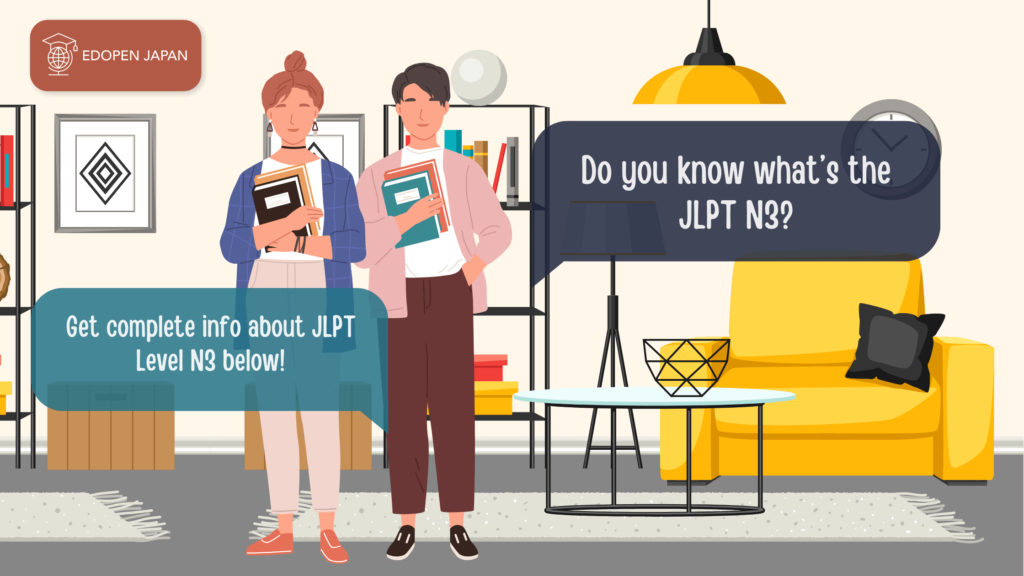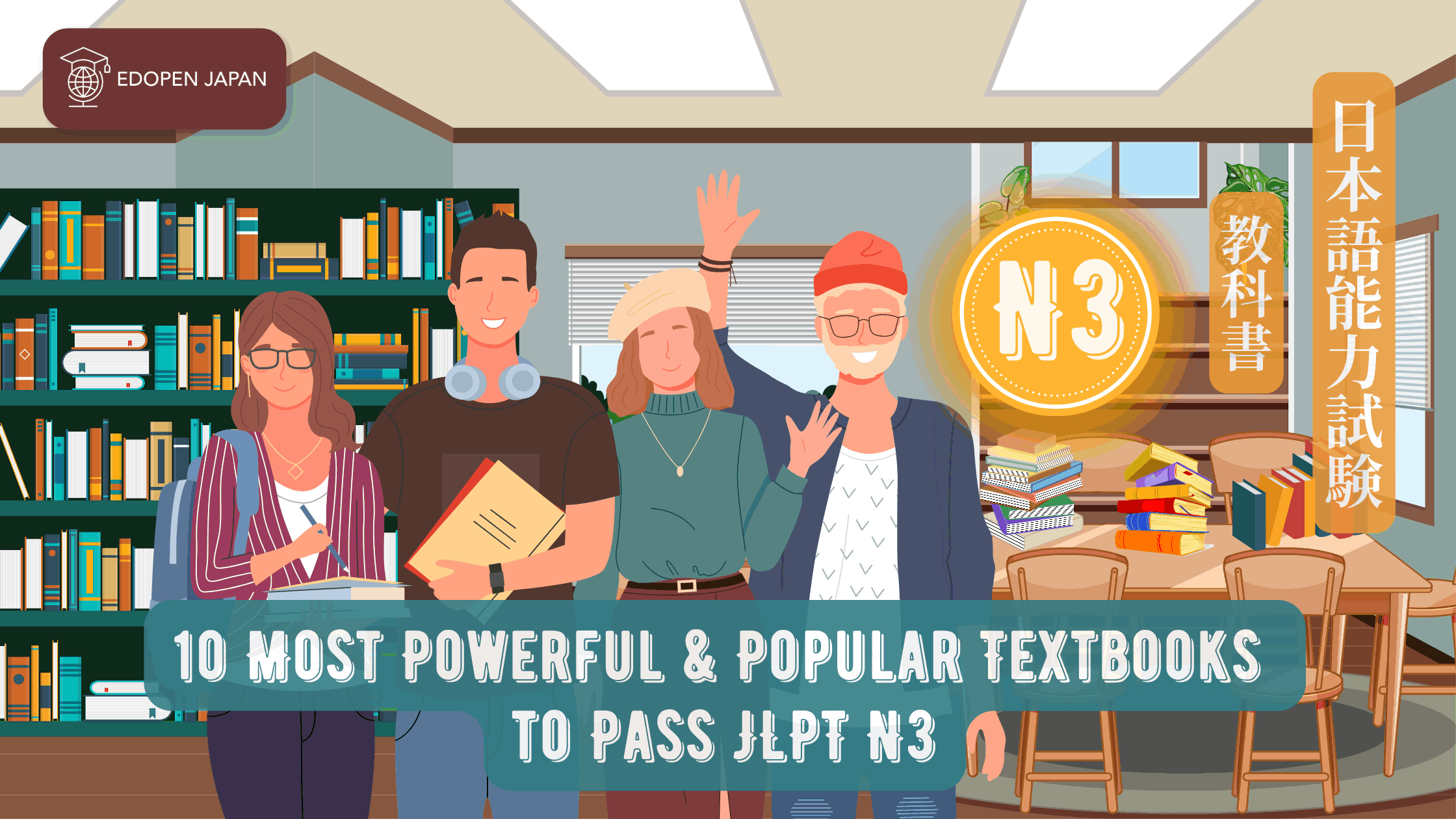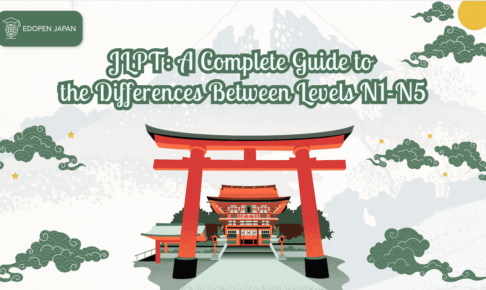The Japanese Language Proficiency Test provides legal recognition, official certification, and even qualification recognition of a non-native speaker’s Japanese language proficiency. To excel in the JLPT, you must comprehend the nature and execution of this language proficiency test.
In this article, we will review the top 10 textbooks to successfully pass the JLPT N3 exam. Before proceeding, please click the button below to discover the textbooks that are recommended for passing the JLPT N5 and N4 exams.
We encourage you to explore additional articles to broaden your knowledge and understanding of the JLPT. Following your reading of this article, we welcome your feedback and thoughts in the comment section below. To broaden your understanding and knowledge of JLPT, please take a look at our recommended reading below! Thank you and let’s begin!
Read also:
Get Ready for JLPT N3: 100 Kanji List
JLPT N3 Vocabulary | The Most Complete Lists
Contents
About JLPT N3

The JLPT N3 is the intermediate tier of the Japanese Language Proficiency Test (JLPT). Successfully completing the JLPT N3 exam confirms proficiency in Japanese at an intermediate level, serving as ample evidence of Japanese proficiency for academic and occupational spheres.
Companies and educational institutions commonly require the JLPT N3 exam as a minimum prerequisite. The JLPT N3 assesses learners’ knowledge in five distinct areas, akin to the JLPT N5 and N4 as follows!
| 1. Grammar (文法 / bunpou) |
| 2. Vocabulary (語彙 / goi) |
| 3. Kanji (漢字 / kanji) |
| 4. Reading Comprehension (読解力 / dokkai ryoku) |
| 5. Listening Comprehension (聴解力 / Chōkai ryoku) |
The JLPT N3 examination comprises three sections: language knowledge (vocabulary) in 30 minutes, language knowledge (grammar) & reading in 70 minutes and listening in 40 minutes.
1. Language knowledge (Vocabulary) – 30 minutes
What are the components of each section of the JLPT N3 exam? Each section of the exam has a specific component that is tested with its specified goal of measuring each individual’s ability. For language knowledge or skills, please read tWhat are the components of each section of the JLPT N3 exam? Each section of the exam has a designated component, which aims to assess individual abilities. To evaluate language knowledge or skills, please refer to the following 5 items below:
| 1. Kanji reading | Test reading of the words written in kanji. |
| 2. Orthography | Test kanji for words written in Hiragana. |
| 3. Contextually-defined expressions | Test words whose meaning is defined by context. |
| 4. Paraphrases | Test words and phrases with similar meanings. |
| 5. Usage | Test the use of words in sentences. |
2. Language Knowledge (Grammar) & Reading – 70 minutes
On the other hand, for the language knowledge or Grammar and reading, please read the 7 important items as follows:
| 1. Sentential grammar 1 grammar form selection) | Examine judgment of sentence-appropriate grammatical formats. |
| 2. Sentential grammar 2 (grammar form selection) | Examine syntactically correct and meaningful sentence composition. |
| 3. Text grammar | Examine judgment of suitability of sentences for text flow. |
| 4. Comprehension (short passages) | Test content comprehension by reading original texts of approximately 150-200 characters, such as descriptions and instructions on various topics, including everyday life and work. |
| 5. Comprehension (mid-size passages) | Test comprehension of keywords and causal relationships by reading the texts of approximately 350 characters, such as original commentaries and essays. |
| 6. Comprehension (long passages) | Testing comprehension of summaries and logical developments by reading the texts of approximately 550 characters, e.g., commentaries, essays, and letters. |
| 7. Information retrieval | Testing the ability to extract necessary information from original materials such as advertisements and brochures (approx. 600 characters). |
3. Listening – 40 minutes
Further, for the listening comprehension, please read the following items:
| 1. Task-based comprehension | Testing content comprehension by listening to a connected text (testing the ability to extract the necessary information to solve specific problems and understand appropriate actions). |
| 2. Comprehension of key passages | Testing content comprehension by listening to a connected text (testing the ability to narrow down points based on necessary information presented in advance). |
| 3. Comprehension of the general outline | Test comprehension of content by listening to a connected text (test understanding of speaker’s intent and ideas from the overall text). |
| 4. Verbal expressions | Test ability to select appropriate verbal expressions by listening to circumstances while looking at illustrations. |
| 5. Quick response | Test ability to select appropriate responses by listening to short utterances such as questions. |
Grammar Drill Textbooks for JLPT N3

The aim of the JLPT N3 grammar exam is to comprehend a minimum of 150-180 Japanese grammar points, covering aspects of both everyday life and the workplace. Specifically, at the N3 level, some examples of grammar points include:
| 1. Basic use of particles, their application and basic grammatical structure. |
| 2. The word form and an appropriate verb patterns. |
| 3. Expressions showing an alternative, an approximation, remembering a piece of information, and other specific expressions |
Please read the following three books to assist you in preparing for the JLPT N3 grammar!
1. Speed Master JLPT N3 Grammar

To successfully pass the JLPT N3, preparation is key. An important aspect to master is N3 grammar. Master – Quick Mastery of N3 Grammar is a recommended resource. The book comprises three sections, which outline:
| 1. Warm-up | A preliminary explanation of the grammar used in JLPT N3. How to understand texts and sentences when given relevant information. |
| 2. Exercise | The exercises contain text similar to the original text of the JLPT N3 exam. |
| 3. Practice Test | In this section, you can learn firsthand how the JLPT N3 exam works. There are 3 practice tests. You can use them to measure how well prepared you are for the JLPT N3. |
2. Mimi Kara Oboeru: Mastering Grammar

Are you someone who learns best by listening? If so, this book is ideal for JLPT N3 exam preparation. Titled “Mimi Kara Oboeru: Mastering Grammar through Auditory Learning – New JLPT N3!”, it boasts audio-centric learning in grammar mastery. As the title implies, this book boasts three significant advantages as follows:
| 1. You can learn JLPT N3 by hearing a vocabulary. |
| 2. You can get the sample sentences dictated to you |
| 3. Then, you just need to repeat (or repeat after) the sample sentences |
This book enables natural mastery of grammar concepts and features numerous practice questions, increasing the likelihood of achieving fluency in the JLPT N3 exam within a short timeframe.
3. Dictionary of Japanese Grammar Series

One of the essential resources for any Japanese language learner, particularly those seeking success at all levels of the JLPT exam, is a Japanese dictionary. This dictionary, the Dictionary of Japanese Grammar, is essential for your JLPT N3 exam preparation. A companion for intermediate and advanced levels is a necessity.
The Intermediate Dictionary’s second edition has undergone extensive reviews and is now known as the most inclusive reference for Japanese grammar to date. The material has been elaborately explained, encompassing around 200 Japanese grammatical concepts.
You need not fret about encountering challenging words anymore. Employ this dictionary as an aid for your JLPT N3 exam readiness.
Kanji & Vocabulary Drill Textbooks for JLPT N3

To successfully complete the JLPT N3, a comprehensive understanding of approximately 3,750 Japanese vocabulary words and 650 kanji characters is required. The 3,750 vocabularies on the JLPT N3 include nouns, verbs, adjectives, and foreign language absorptions words in Katakana.
In addition, the 650 kanji tested cover a wider range of topics and levels than in the JLPT N4 level. Most of these kanji are very common in daily life, both in the workplace and in schools or universities in Japan. Therefore, the JLPT N3 level is frequently utilized as the minimum requirement for entry into universities and corporations in Japan.
1. Kanji Master JLPT N3

The Kanji Master JLPT N3 book is highly popular due to its comprehensive and extensive series. Kanji Master JLPT N3 has:
| 1. 18 units with very diverse topic that often comes out on the JLPT N3 exam. |
| 2. English, Chinese, and Vietnamese translation. |
| 3. Sufficient question drills to pass JLPT N3. |
| 4. Review tests and quizzes. |
2. 2000 Essential Vocabulary for the JLPT N3

This book is highly sought-after, particularly for those studying for the JLPT N3 exam. It covers a diverse range of 2000 commonly-used vocabulary words featured in the JLPT, alongside everyday life contexts, presented in an engaging manner. With clear topics, illustrative sentences, and translations in English and Vietnamese, any reader can effortlessly learn new words while picturing their practical usage.
In addition, the 2000 Essential Vocabulary for JLPT N3 comprises the subsequent components:
| 1. Vocabulary words, English and Vietnamese translation. |
| 2. Example sentences that are very applicable. |
| 3. The check box to mark the part you have understood 12 chapters on very comprehensive topics found in JLPT N3. |
| 4. The red sheet to answer the missing words in the example sentences is included as an exercise. |
Practice JLPT N3 Exam with Complete Set Textbooks

To successfully pass the JLPT N3 assessment, diligent and regular practice is imperative. Solving a plethora of questions and persistently attempting the exam will facilitate a higher degree of familiarity and thus, elevate your chances of success.
Below, we recommend a book that provides a comprehensive set for JLPT N3 preparation. Each set typically covers every competency tested in the JLPT in great detail. Each book in the set provides comprehensive coverage of vocabulary, grammar, kanji, reading, and listening comprehension – encompassing a wide range. Please choose one of the complete sets of your JLPT N4 preparation book below!
1. New Kanzen Master JLPT N3

The New Kanzen Master JLPT N3 textbook proves highly sought-after among learners preparing for the JLPT N3 exam, as well as those studying at other levels. Each set comprises five books:
| 1. New Kanzen Master JLPT N3 – Kanji | Includes over 420 Kanji covered in 25 chapters. |
| 2. New Kanzen Master JLPT N3 – Listening | Trains quick listening and speaking skills and how to process information received through multiple questions. |
| 3. New Kanzen Master JLPT N3 – Grammar | Covers a wide range of skill practice of all JLPT N3 grammar points and how to use them correctly. |
| 4. Kanzen Master JLPT Level 3 – Vocabulary | Covers all the vocabulary that often comes out in the JLPT N3 exam. |
| 5. Kanzen Master JLPT N3 – Reading | Covers many JLPT N3 reading proficiency practice questions in a very wide range of areas with high potential to come out in the JLPT N3 exam. |
2. JLPT N3 Points and Practice

This series on JLPT N3 Points & Practice is certainly fascinating for many Japanese learners. Its uniqueness lies in its inclusion of tactful questions and helpful hints aimed at aiding your success in the JLPT N3 exam. In one complete set of the JLPT N3 Points and Practice series, you will receive three books, as outlined below:
| 1. JLPT N3 Points & Practice Series – Grammar | Covers all the materials sufficient for the JLPT N3 exam material covered in 12 units. |
| 2. JLPT N3 Points & Practice Series – Vocabulary | Covers all the most frequently occurring vocabulary in the JLPT N3 exam spread over 30 units. |
| 3. JLPT N3 Points & Practice Series – Listening Proficiency | Discusses all the question types and patterns that appear in the JLPT N3 listening exam covered in 12 chapters. |
Furthermore, all answers and explanations have been comprehensively listed in three languages – English, Chinese, and Vietnamese, accompanied by visually appealing illustrations. The book is highly suitable for self-study purposes.
3. Nihongo So-Matome JLPT N3

The Nihongo So-Matome book consistently ranks among the most coveted resources sought by those preparing for JLPT. Nihongo So-Matome offers the entire range of JLPT prep materials for every level. For instance, for those studying for JLPT N3, there is a complete set comprising five books. The books available in a complete set of Nihongo So-Matome JLPT N3 comprise the following:
| 1. Nihongo So-Matome JLPT N3 – Grammar | Covers all the grammar exercises for the JLPT N3 exam. The materials are categorised by specific themes. With regular practice of 2 pages per day, you can complete JLPT N3 exam preparation for grammar in a mere 6 weeks. |
| 2. Nihongo So-Matome JLPT N3 – Kanji | The book comprises six chapters with seven sub-lessons per unit, equating to a total of 336 kanji and 850 vocabulary words. |
| 3. Nihongo So-matome JLPT N3 – Reading Comprehension | The resource comprises six chapters, each containing seven lessons. It encompasses various topics related to daily life, including questions that hold significant importance for the JLPT N3 exam. |
| 4. Nihongo So-matome JLPT N3 – Vocabulary | The course consists of six chapters, each containing seven units. It covers 1,200 frequently appearing words in the JLPT N3 exam and includes adorable illustrations to assist with context comprehension. |
| 5. Nihongo So-matome JLPT N3 – Listening Comprehension | Covers very comprehensive subject matter and likely to appear in the JLPT N3 exam. The queries are created to enhance proficiency in Japanese listening comprehension with common sentence structures that frequently appear on the JLPT N3. |
4. Try! Japanese Language Proficiency Test N3

The guidebook for the Japanese Language Proficiency Test N3, Try!, is an ideal resource for those on a budget who wish to master all the concepts examined in the assessment with just one book. Positive feedback from multiple JLPT N3 participants confirms its effectiveness.
Furthermore, it features 11 chapters that encompass a broad spectrum of everyday themes that may arise in JLPT N3 assessments. With only one book, you can acquire grammar, kanji, vocabulary, reading and listening skills, thanks to the Audio CD that is included.
5. Drill and Drill JLPT N3

The JLPT N3 Drill and Drill book is the ideal resource if you aim to master questions that resemble those in the actual JLPT N3 test. In fact, the team responsible for this book conducted thorough research to evaluate and refine the material to best reflect the JLPT N3 exam. In one set of JLPT N3 Drill and Drill book, you will receive three books as outlined below:
| 1. Drill and Drill JLPT N3 – Grammar | Discusses all grammar-related questions that are very similar to the original JLPT N3 exam. |
| 2. Drill and Drill JLPT N3 Vocabulary | Covers the entire vocabulary content tested in the original JLPT N3 exam. |
| 3. Drill and Drill JLPT N3 – Listening and Reading | This resource covers essential topics and materials for the Japanese Language Proficiency Test N3 in terms of both listening and reading comprehension. |
All answers are accompanied by comprehensive explanations and extremely helpful answer for all learners in English.
Conclusion
Please review the listed textbooks to ace JLPT N3 in 2023 below!
| Grammar Drill Textbooks for JLPT N3 | 1. Speed Master JLPT N3 Grammar 2. Mimi Kara Oboeru: Mastering “Grammar” 3. Dictionary of Japanese Grammar Series |
| Kanji & Vocabulary Drill Textbooks for JLPT N3 | 1. Kanji Master JLPT N3 2. 2000 Essential Vocabulary for the JLPT N3 |
| Complete Set Textbooks for JLPT N3 | 1. New Kanzen Master JLPT N3 2. JLPT N3 Points and Practice 3. Nihongo So-Matome JLPT N3 4. Try! Japanese Language Proficiency Test N3 5. Drill and Drill JLPT N3 |
We welcome feedback and suggestions for our improvement. We hope you pass JLPT N3 successfully!














